Which problem is being solved?
Due to technological progress, which presents itself in the social sphere and, in particular, in modernized training, the demands on educational staff are increasing. As a result of the changing requirements, new digital media is used in some spectacular ways. These changes present difficulties for those who work in vocational education.
A structured qualification of trainers and teachers in a teaching and learning laboratory allows for tailor-made training for learning using the latest media such as augmented and virtual reality, 3D printing, and the Internet of Things (Internet of Things). This is groundbreaking, both technologically and didactically.
DIOS (didactic innovation labs) is a transnational project that develops, tests, assesses, and transmits teaching and learning scenarios for educational staff qualification. The emphasis is on hands-on training in chemistry, mechatronics, and information technology. Educational personnel are instructed to incorporate the training’s material, to expand it further, and to generate new content. As a result, DIOS
How is the problem solved?
- Learning videos for the qualification of vocational training staff in chemistry (laboratory and plant), mechatronics, and IT using AR, VR, 360 ° videos, 3D printing, and IoT (intelligent sensors)
- Learning videos for the qualification of vocational training staff in chemistry (laboratory and plant), mechatronics, and IT using AR, VR, 360 ° videos, 3D printing, and IoT (intelligent sensors)
- Establishment of five teaching and learning laboratories for the qualification of trainers in vocational training in Germany, the Netherlands, Slovenia, the Czech Republic, and Cyprus • Development, testing, evaluation, and transfer of teaching and learning scenarios enriched with AR, VR, 360° videos, 3D printing, and IoT for practical training
Results so far:
Didactic guidelines (follows)
Next outputs:
Industry-specific
teaching and learning scenarios Teaching and learning laboratories
Project duration:
November 2020 to October 2022
Project partner:
- SBG Dresden (DE) – project management
- SCP SERV LIMITED (CY)
- Graafschap College (NL)
- Solski Center Kranj (SI)
- SPSCH Pardubice (CZ)
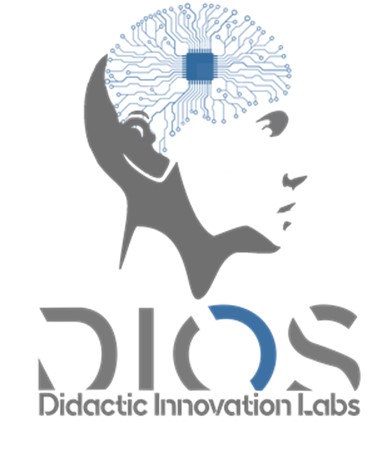
Book a call for Dios Labs
Which problem is solved?
Digital technologies are changing almost every aspect of our daily lives. Trainers and vocational school teachers in particular need digital skills to keep up with technological, educational and social developments in the world of work. The application of new technologies in vocational training requires new teaching and learning concepts. A new technology with great potential is Augmented Reality (AR).
This new teaching and learning method requires appropriate concepts and content in order to provide (company) trainers with the necessary skills for their use in theory and practice classes. So far, however, there has been no structured qualification offer for trainers. AR4VET closes this gap and thus makes a contribution to vocational training 4.0.
How is the problem solved?
- Provision of didactic guidelines for the didactically induced use of AR in theory and practice lessons
- Development of a structured blended learning qualification offer for (company) trainers with the aim of integrating AR into existing teaching and learning concepts
- Best practice manual for the use of AR in vocational training in 4 focus industries
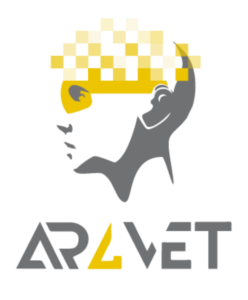
Project number: 2020-1-CZ01-KA202-078371
Partners:
- Střední průmyslová škola chemická Pardubice (Czech Republic – coordinator)
- SBG Dresden (Germany – partner)
- Ugniagesiu Gelbetoju Mokykla (Lithuania – partner)
- University of Žilina (Slovakia – partner)
- C.P.SERV LIMITED (Cyprus – partner)
- The Estonian Academy of Security Services (Estonia – partner)
Project summary
Firefighters are the role-model of modern heroes: a brave life safer in emergency situations. This positive image is tested each day and sometimes to the limit. Firefighters are all-rounders, rescuers, of persons and goods, and team-players. A wrong or slow response can set human lives at risk. To respond and react to emergencies accordingly, in a timely and a professional manner, firefighters need to be up to date. This helps them to catch up with the increased methodological, strategic and technical demands of modern firefighting.

The use of modern media with implementation of AR or VR visualisations will foster digital skills among teaching personnel and learners and aim to transform existing teaching and learning forms. This results in a higher motivation among learners and the transition of the trainer’s role from an instructor to a moderator. AN EXPERIMENTAL INCLUSION OF PARTICIPANTS with special needs in this context will be targeted
by supporting dyslectic participants with mixed reality experiences as a compensatory measure where visual input can serve as a partial substitute to textual presentations. THE NEED TO USE OF AR, VR, 360° VIDEO AND 3D (BIO-) PRINTING is reflected by the results of an upfront online survey. 91% of teachers/trainers have a high interest on the technology use and the qualification in the didactic innovation training hubs.
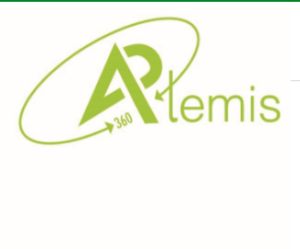
Check our our VR app
XR4CRAFTS
Overview
The XR4CRAFTS Erasmus+ project focuses on revolutionizing vocational training in craftsmanship by integrating cutting-edge Extended Reality (XR) technologies such as Augmented Reality (AR), Virtual Reality (VR), and future VR haptic applications. Recognizing the increasing demand for digital media skills in training and workplace settings, XR4CRAFTS addresses the critical need for structured qualifications and innovative learning materials for trainers and learners in the crafts sector.
Why XR4CRAFTS?
Vocational education in crafts like painting, masonry, carpentry, and parquet-laying is facing challenges due to:
- Lack of digital tools: Limited teaching materials for incorporating AR/VR technologies.
- Skills gap: Trainers and students lack practical exposure to digitalized workflows.
- Low adoption of XR: Only 3% of SMEs in the construction industry used VR in 2019.
This hinders professional development, discourages companies from offeri

News 1: Introducing XR4Crafts: Transforming Craftsmanship Training through Virtual Reality
The XR4Crafts project is setting a new standard in vocational training by introducing mixed reality technologies to enhance hands-on skills. Utilizing Microsoft HoloLens and VR headsets, XR4Crafts brings immersive training experiences to fields such as painting, carpentry, and bricklaying. This innovative approach allows trainees to practice essential techniques in a safe, simulated environment, preparing them to meet modern industry demands with confidence.
Funded by the Erasmus+ KA2 initiative, XR4Crafts brings together a consortium of European partners aiming to modernize vocational training across the EU. By integrating digital media into traditional craftsmanship training, XR4Crafts addresses a growing need for tech-savvy artisans in today’s workforce.
News 2: XR4Crafts Empowers Craftspeople with Augmented Reality and Haptic Feedback
Through XR4Crafts, artisans can now access augmented reality (AR) and haptic VR gloves, providing a realistic touch simulation for tasks like painting, sanding, and layering. These technologies allow users to feel textures, weights, and resistances, adding a new dimension to virtual training. Carpenters, painters, and other tradespeople benefit from lifelike practice scenarios that help them master advanced skills before setting foot in real-world workspaces.
This addition of haptic feedback to VR learning environments is groundbreaking, especially for training that traditionally relies on manual precision. XR4Crafts is leading the way in making these high-tech tools accessible for craftsmen, enhancing their skills and boosting the overall quality of workmanship across Europe.
News 3: Pioneering Inclusive Training Solutions for Diverse Learners with XR4Crafts
The XR4Crafts project is also making strides in inclusivity by designing its learning modules to accommodate diverse needs. Trainees with learning difficulties, including dyslexia, benefit from interactive visualizations, reducing reliance on text-heavy instructions. The project supports gender equality and accessibility by enabling participants with different skill levels to engage equally through AR and VR-enhanced scenarios.
These efforts are aligned with the EU’s Digital Education Action Plan, which promotes inclusive, digital learning environments across all sectors. XR4Crafts ensures that no learner is left behind, making technology-driven vocational training accessible for all.
News 4: Sustainability at the Core: XR4Crafts Reduces Environmental Impact of Training
A notable feature of XR4Crafts is its commitment to sustainable training methods. Using VR simulations, trainees can practice skills without consuming physical materials, reducing waste and the carbon footprint of traditional training. In trades like bricklaying and painting, these simulations allow learners to work with virtual cement or paint, saving real materials for on-the-job applications and minimizing environmental impact.
This digital-first approach aligns with EU goals for greener education and industry practices, marking XR4Crafts as a leader in eco-conscious vocational training. By reducing the need for consumable materials, XR4Crafts is helping craft industries transition toward sustainable practices.
News 5: XR4Crafts’ Pan-European Partnership Boosts Digital Transformation in Craftsmanship
The XR4Crafts project brings together a unique consortium of organizations from Germany, Spain, Cyprus, France, and Belgium. This partnership leverages diverse expertise in digital media, vocational training, and craftsmanship, aiming to boost the digital transformation of trade professions. By 2024, XR4Crafts is set to produce tailored teaching scenarios across EU partner nations, improving training quality and digital competency for artisans.
This project exemplifies how cross-border collaboration can address common challenges, such as skill shortages and technological adoption, within traditional trades. XR4Crafts partners are committed to setting a digital roadmap for the crafts industry, benefiting workers and trainees across Europe.
On February 24th, we had the pleasure of hosting our first Transnational Project Meeting (TPM1) in Cyprus for our ongoing project. The event marked an important milestone in our collaboration and provided an opportunity for productive discussions and exchange of ideas.
We would like to extend our heartfelt gratitude to our Polish partners for their valuable contributions and active engagement during the meeting. Their insights and expertise have been instrumental in shaping the direction of the project, and we look forward to continuing our fruitful partnership as we work together towards our shared objectives.
As we move forward, we are confident that our collective efforts will yield significant progress in the project, leading to meaningful outcomes and lasting impact.
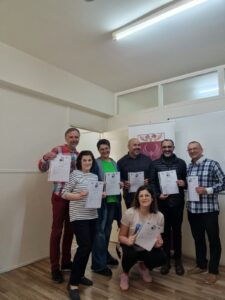
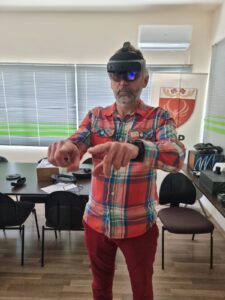
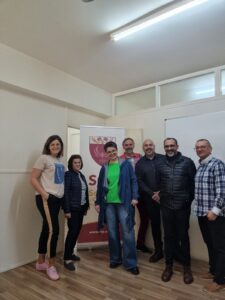
NEWS
We are excited to announce our involvement in the Erasmus+ CHOPIN project, which focuses on enhancing digital and language skills in school education. CHOPIN is a small-scale partnership in school education, and our company is collaborating with Swietokrzyskie Centrum Doskonalenia Nauczycieli (Poland) under the KA210-SCH program.
The CHOPIN project has four primary objectives:
- Promote professional, personal, and digital skills among school teachers for language learning. The project integrates digitally-supported teaching and learning, encouraging the use of new technologies to make language learning more appealing.
- Incorporate modern Virtual Reality (VR) in teacher training. This innovative approach enriches language learning by providing teachers with experience in using VR and CLIL (Content and Language Integrated Learning) to improve the quality of their training.
- Develop students’ Lower Order Thinking Skills (LOTS) into Higher Order Thinking Skills (HOTS).
- Ensure the sustainability of project results by raising sustainable interest in the project results, even after the project has finished, through sharing and promotion.
The CHOPIN project addresses digital transformation through the development of digital readiness, resilience, and capacity. It also promotes a comprehensive approach to language teaching and learning, focusing on awareness about the European Union, digital skills and competences, and the teaching and learning of foreign languages.
The CHOPIN training model’s qualification concept uses structured matrices of learning outcomes to ensure a comprehensive and effective learning experience. It integrates the CLIL 4 Cs (Content, Communication, Cognition, and Culture) and leverages Virtual Reality for bilingual learning. The matrices cover key areas and are designed to progressively build knowledge and skills. They are specific, measurable, attainable, relevant, and time-bound (SMART), helping participants track their progress. The concept promotes a holistic approach, fostering deep understanding and transferable skills for real-world application.
The challenges faced by bilingual educators in accessing adequate resources for bilingual content aligned with the core curriculum highlight the need for innovative solutions. Virtual reality (VR) emerges as a powerful tool to engage students and enhance their understanding and retention of subject matter. The CHOPIN project for Teacher Training aims to improve language teaching through the implementation of Content and Language Integrated Learning (CLIL) with VR elements. The project focuses on developing teachers’ professional, personal, and digital skills in language learning and the use of VR. As studies indicate the growing potential of VR in education, including bilingual education, it becomes evident that integrating VR and other technological advancements can significantly impact the effectiveness of educational experiences.
Book an appointment for Chopin project
Introducing VRGreenAdventure: Shape a Greener Tomorrow, Today
Transformative Learning, One Click Away
Welcome to VRGreenAdventure, your gateway to transforming the future of environmental education. Imagine a world where every child becomes an agent of change, empowered with the knowledge and motivation to make sustainable choices. With VRGreenAd, this vision is not just possible—it’s happening!
Why Choose VRGreenAd?
- Immersive Experiences: Dive into the future of learning with our breathtaking 360-degree videos. Venture into diverse ecosystems, understand climate change up close, and gain a firsthand experience of what’s at stake—all from the comfort of your home or classroom.
- Engage & Empower: Educators, we’ve got your back! Access our treasure trove of resource-rich, curriculum-aligned teaching modules, and drive home the sustainability message like never before.
- Play to Learn: Engage the minds of tomorrow’s leaders with our compelling sustainability-themed game, where education meets entertainment in an unforgettable way.
Exclusive Features
- Website Accessibility: The heart of our educational offerings is housed at VRGreenAd.eu, where you’ll find everything from teaching materials to interactive games, all optimized for mobile and desktop use.
- Virtual Reality: Our 360-degree videos offer an unrivaled learning experience, transporting children to the frontline of environmental conservation efforts.
- Educational Game: Take a break from traditional learning! Our educational game amplifies the learning process through fun, interactive scenarios that enhance engagement and retention.
Elevate Your Learning Experience
- For Students: Broaden your understanding of the world around you. Walk through digital forests, explore the ocean floors, and become a champion of the Earth, all while having a great time.
- For Teachers: Ignite the spark of sustainability in your classroom. Utilize our extensive range of teacher resources to shape curriculums, guide discussions, and inspire the next generation.
- For Everyone: This is not just an educational platform; it’s a movement. Be part of a community that values sustainability, shares knowledge, and creates a wave of change that will echo for generations.
Your Invitation to a Greener Future
Don’t miss out on this revolutionary journey to a sustainable future. VRGreenAd is more than just a project; it’s a paradigm shift in how we educate, engage, and empower the green change-makers of tomorrow. Join us now at VRGreenAd.eu and be part of the change you wish to see in the world!
Let’s make the future green, together! ???? Visit our website now: https://vrgreen.eu/
Το LMi.04Dis_ABLED εντοπίζει 20 αναδυόμενες επαγγελματικές θέσεις για άτομα με αναπηρίες. Συγκεκριμένα το LMi.04Dis_ABLED επικεντρώνεται στη διευκόλυνση της πρόσβασης σε ποιοτικές πληροφορίες αγοράς εργασίας (LMI) για νέες και αναδυόμενες επαγγελματικές επιλογές με σκοπό τη βελτίωση της προσβασιμότητας της αγοράς εργασίας, των επαγγελματικών φιλοδοξιών και ευκαιριών, της οικονομικής ευημερίας και της αυτόνομης ζωής για άτομα με αναπηρίες.
Ένα προσαρμοσμένο Οδηγός Πληροφοριών Αγοράς Εργασίας και Σταδιοδρομίας για άτομα με αναπηρίες έχει αναπτυχθεί για να λειτουργήσει ως εργαλείο υποστήριξης πληροφοριών για εκπαιδευτές, εκπαιδευτικούς, επαγγελματίες καθοδήγησης και κοινωνικής ένταξης. Αυτός ο οδηγός παρουσιάζει τις κύριες τάσεις της αγοράς εργασίας, τους επαγγελματικούς τομείς και μια επιλογή από 20 επαγγελματικές θέσεις που προσαρμόζονται σε άτομα με αναπηρίες.
Σε κάθε περιγραφή επαγγέλματος έχουν αναλυθεί δεδομένα της αγοράς εργασίας, μια περίληψη των σχετικών ευθυνών, δραστηριοτήτων, προσόντων και βασικών ικανοτήτων. Επιπλέον, περιλαμβάνονται οι κύριες λειτουργίες του επαγγέλματος και οι απαιτήσεις της θέσης εργασίας, καθώς και η πρόβλεψη για την ενσωμάτωση ατόμων με αναπηρία.
Οι 20 εντοπισμένες θέσεις εργασίας ήταν: • Συντονιστής διοικητικών υπηρεσιών • Μηχανικός τεχνητής νοημοσύνης
- Σύμβουλος σταδιοδρομίας
- Πάροχος υπηρεσιών πελατών
- Ειδικός ηλεκτρονικού εμπορίου
- Εργάτης γεωργίας και κήπου
- Βοηθός προετοιμασίας φαγητού
- Σύμβουλος για τη χρηματοδότηση
- Εργάτης χειροτεχνίας και εκτύπωσης 3D
- Υπάλληλος ξενοδοχείου και θερέτρου
- Μηχανικός ασφάλειας πληροφοριών
- Ειδικός εφαρμογών πληροφορικής
- Τεχνικός ιατρικών εξοπλισμών
- Διαδικτυακός εκπαιδευτής
- Προσωπικός
Promoting Inclusive Labor Market Opportunities for People with Disabilities
The European Pillar of Social Rights and the European Strategy on the Rights of Persons with Disabilities 2021-2030 prioritize inclusion and dignity for individuals with disabilities. Recognizing their right to a supportive working environment, the Erasmus+ project LMI04.Dis_ABLED (2022-1-ES01-KA220-VET-000086517) addresses barriers to equal career opportunities by enhancing labor market information (LMI) and vocational inclusion services.
Key outcomes of the project include:
- Accessible LMI tools tailored to the needs of individuals with disabilities.
- Training programs and competency manuals for professionals offering guidance, job information, and inclusion services.
- A digital professional information system, empowering both individuals with disabilities and the professionals supporting them.
These achievements improve awareness, accessibility, and the quality of career guidance for people with disabilities. They also promote inclusive career paths aligned with ecological and digital transitions, fostering informed decision-making and career readiness. Explore more at LMI Dis_ABLED Project.
Πιο γρήγορο 3D, Όχι μόνο η χρήση ψηφιακών μέσων στην επαγγελματική κατάρτιση, αλλά και η απλή δημιουργία τους
Ποιο πρόβλημα επιλύεται;
Η ψηφιακά υποστηριζόμενη διδασκαλία και μάθηση αποτελεί αναπόσπαστο μέρος όλων των εκσυγχρονισμένων επαγγελμάτων κατάρτισης. Η χρήση των τελευταίων εκπαιδευτικών τεχνολογιών καθιστά δυνατή την εύκολη δημιουργία διαδραστικού τρισδιάστατου περιεχομένου για την υποστήριξη της μάθησης με και μέσω της αντίστοιχης τεχνολογίας. Αυτό προάγει τους υποστηριζόμενους από τα μέσα τρόπους σκέψης και εργασίας στο πλαίσιο της απόκτησης πρακτικών επαγγελματικών δεξιοτήτων.
Το Faster 3D επικεντρώνεται σε μια προσέγγιση “χωρίς κώδικα” (= χωρίς δεξιότητες προγραμματισμού) με στόχο τη δημιουργία τρισδιάστατων μοντέλων για πρακτική εκπαίδευση στη βιομηχανία. Αυτό βασίζεται στην απλή δημιουργία τρισδιάστατων αντικειμένων με ένα smartphone, tablet ή φορητό σαρωτή και στη συνέχεια στη μεταφορά χωρίς προγραμματισμό ως διαδραστικό τρισδιάστατο αντικείμενο (WebVR) και στη χρήση για τρισδιάστατη εκτύπωση.
Στο πλαίσιο μιας μικρής, διακρατικής σύμπραξης, αναζητήθηκαν σχετικές εκπαιδευτικές τεχνολογίες και αναπτύχθηκε, δοκιμάστηκε, αξιολογήθηκε και μεταφέρθηκε περιεχόμενο διδασκαλίας και μάθησης. Η έμφαση δόθηκε στο προσωπικό επαγγελματικής κατάρτισης από τους τομείς της χημείας και της πληροφορικής και στην ικανότητά τους να δημιουργούν τρισδιάστατο περιεχόμενο και να το ενσωματώνουν στην πρακτική εκπαίδευση με τρόπο που να είναι συναφής με τη μάθηση. Με αυτόν τον τρόπο, το FASTER 3D συμβάλλει στο να γίνουν πιο προσιτές οι προηγούμενες εξειδικευμένες τεχνολογίες, ώστε να καταστεί δυνατή η ευρύτερη και απλούστερη εφαρμογή τους.
Πώς επιλύεται το πρόβλημα;
Παροχή διδακτικών κατευθυντήριων γραμμών για την εκπαιδευτική χρήση των τρισδιάστατων σαρώσεων, του WebVR και της τρισδιάστατης εκτύπωσης
Εκπαιδευτικά βίντεο για την επιμόρφωση εκπαιδευτών και καθηγητών επαγγελματικών σχολών
Ανάπτυξη, δοκιμή, αξιολόγηση και μεταφορά διδακτικών και μαθησιακών σεναρίων εμπλουτισμένων με WebVR και τρισδιάστατη εκτύπωση για πρακτική εκπαίδευση
Διαδικτυακό συμπαγές μάθημα για τη δημιουργία και χρήση μέσων (το λεγόμενο μικροπιστοποιητικό)
Οδηγός βέλτιστων πρακτικών
Αποτελέσματα:
Διδακτικές κατευθυντήριες γραμμές για λήψη: DE, EN, GR
Σενάρια διδασκαλίας και μάθησης
Ενότητα Online-Learn
Οδηγός βέλτιστων πρακτικών
Επιπλέον παρουσιάσεις
FASTER 3D kompakt (DE)
Zukunftszentrum Sachsen (26.01.2024)
Epale
Διάρκεια του έργου:
Februar 2023 bis Januar 2024
Συνεργάτης του έργου:

Το έργο Faster3D συγχρηματοδοτείται από το πρόγραμμα Erasmus+ της Ευρωπαϊκής Ένωσης.Χρηματοδοτείται από την Ευρωπαϊκή Ένωση. Ωστόσο, οι απόψεις και οι γνώμες που εκφράζονται είναι αποκλειστικά του/των συγγραφέα/ων και δεν αντανακλούν κατ’ ανάγκη τις απόψεις και τις γνώμες της Ευρωπαϊκής Ένωσης ή του Ευρωπαϊκού Εκτελεστικού Οργανισμού Εκπαίδευσης και Πολιτισμού (EACEA). Ούτε η Ευρωπαϊκή Ένωση ούτε ο EACEA μπορούν να θεωρηθούν υπεύθυνοι γι’ αυτές.
Faster 3D”is an innovative project designed to revolutionize vocational training by simplifying the creation and use of digital media, specifically interactive 3D content. It addresses the growing need for digitally-supported teaching and learning in modern training occupations, particularly in fields like chemistry and IT.
The project introduces a “no-code” approach, eliminating the need for programming knowledge. This makes it easier to generate and integrate 3D models into practical training, especially for industry applications. Starting from basic 3D object generation, the project enables the creation of interactive 3D objects for WebVR and 3D printing.
The primary goal of “Faster 3D” is to mainstream advanced, yet underutilized, educational technologies in vocational training. By doing so, it encourages a media-supported approach to thinking and working, enhancing the acquisition of practical professional skills.
A key component of the project is its transnational partnership, which involves collaboration in the development, testing, evaluation, and transfer of content. This partnership focuses on empowering trainers to create and effectively integrate 3D content into practical training.
The problem-solving strategy of “Faster 3D” includes:
- Providing didactic guidelines for effectively using 3D scans, WebVR, and 3D printing in learning environments.
- Offering learning videos to qualify trainers and vocational school teachers.
- Developing, testing, evaluating, and transferring teaching and learning scenarios enriched with WebVR and 3D printing.
- Creating an online-based compact course on media creation and use, termed a microcredential.
- Compiling a best practices guide.
The project will deliver various outputs such as didactic guidelines, teaching and learning scenarios, online learning modules, and a best practice guide.
Running from February 2023 to January 2024, “Faster 3D”
Greek
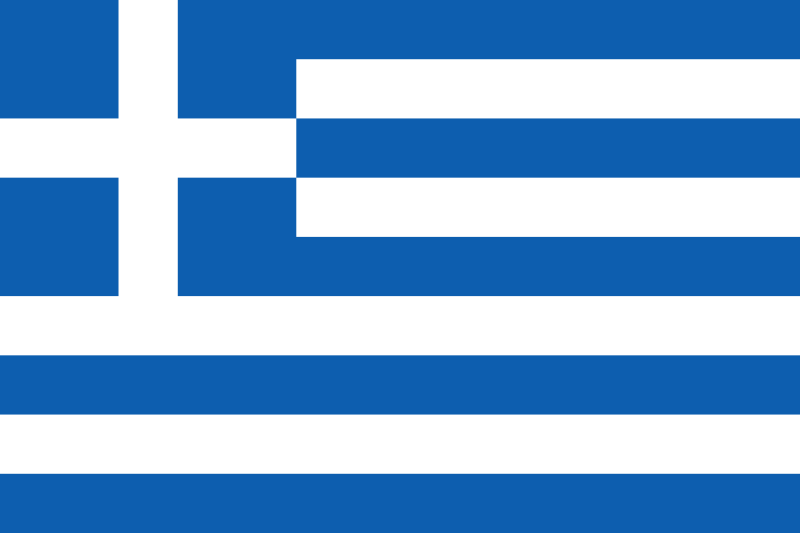
Το “Faster 3D” είναι ένα καινοτόμο έργο που έχει σχεδιαστεί για να φέρει επανάσταση στην επαγγελματική κατάρτιση απλοποιώντας τη δημιουργία και τη χρήση ψηφιακών μέσων, ειδικά διαδραστικού τρισδιάστατου περιεχομένου. Αντιμετωπίζει την αυξανόμενη ανάγκη για ψηφιακά υποστηριζόμενη διδασκαλία και μάθηση στα σύγχρονα επαγγέλματα κατάρτισης, ιδίως σε τομείς όπως η χημεία και η πληροφορική.
Το έργο εισάγει μια προσέγγιση “χωρίς κώδικα”, εξαλείφοντας την ανάγκη για γνώσεις προγραμματισμού. Αυτό διευκολύνει τη δημιουργία και την ενσωμάτωση τρισδιάστατων μοντέλων στην πρακτική εκπαίδευση, ιδίως για βιομηχανικές εφαρμογές. Ξεκινώντας από τη βασική παραγωγή τρισδιάστατων αντικειμένων, το έργο επιτρέπει τη δημιουργία διαδραστικών τρισδιάστατων αντικειμένων για WebVR και τρισδιάστατη εκτύπωση.
Ο πρωταρχικός στόχος του “Faster 3D” είναι η ενσωμάτωση προηγμένων, αλλά ανεπαρκώς χρησιμοποιούμενων εκπαιδευτικών τεχνολογιών στην επαγγελματική κατάρτιση. Με τον τρόπο αυτό, ενθαρρύνει μια υποστηριζόμενη από τα μέσα προσέγγιση της σκέψης και της εργασίας, ενισχύοντας την απόκτηση πρακτικών επαγγελματικών δεξιοτήτων.
Βασικό στοιχείο του έργου είναι η διακρατική του σύμπραξη, η οποία περιλαμβάνει τη συνεργασία στην ανάπτυξη, τη δοκιμή, την αξιολόγηση και τη μεταφορά του περιεχομένου. Η σύμπραξη αυτή επικεντρώνεται στην ενδυνάμωση των εκπαιδευτών για τη δημιουργία και την αποτελεσματική ενσωμάτωση τρισδιάστατου περιεχομένου στην πρακτική εκπαίδευση.
Η στρατηγική επίλυσης προβλημάτων του “Faster 3D” περιλαμβάνει:
Παροχή διδακτικών κατευθυντήριων γραμμών για την αποτελεσματική χρήση τρισδιάστατων σαρώσεων, WebVR και τρισδιάστατης εκτύπωσης σε περιβάλλοντα μάθησης.
Προσφορά μαθησιακών βίντεο για την εξειδίκευση εκπαιδευτών και καθηγητών επαγγελματικών σχολών.
Ανάπτυξη, δοκιμή, αξιολόγηση και μεταφορά σεναρίων διδασκαλίας και μάθησης εμπλουτισμένων με WebVR και τρισδιάστατη εκτύπωση.
Δημιουργία ενός διαδικτυακού συμπαγούς μαθήματος για τη δημιουργία και χρήση μέσων, το οποίο ονομάζεται μικροπιστοποιητικό.
Σύνταξη οδηγού βέλτιστων πρακτικών.
Το έργο θα παραδώσει διάφορα αποτελέσματα, όπως διδακτικές κατευθυντήριες γραμμές, σενάρια διδασκαλίας και μάθησης, διαδικτυακές ενότητες μάθησης και έναν οδηγό βέλτιστων πρακτικών.
Το έργο “Faster 3D” θα διαρκέσει από τον Φεβρουάριο του 2023 έως τον Ιανουάριο του 2024.

Project Brief: SAFAR – Advanced Firefighter Training Solutions
- Objective: Enhance firefighter training effectiveness using immersive technologies.
- Technologies Used:
- Augmented Reality (AR): Creates an interactive training environment by overlaying digital information in the real world.
- Virtual Reality (VR): Provides a completely immersive training environment for safe, controlled simulations.
- Learning Management Systems (LMS): Facilitates the creation, management, and delivery of training content that can be reused and tailored to individual needs.
- Benefits:
- Cost and Time Efficiency: Reduces the time and expenses required to prepare traditional training grounds.
- Flexibility and Safety: Offers trainers the flexibility to adjust scenarios and reduces risks to trainees.
- Standardization and Monitoring: Enables consistent training standards and continuous monitoring of trainee progress.
- Project Foundation:
- Builds on previous first-hand experiences with AR digital twins and 360° cameras.
- Integrates Extended Reality (XR) to create an engaging training experience.
- Aim:
- To promote the digital transformation of training practices in firefighting and crisis management.
- To facilitate the adoption of modern educational technologies among trainers and trainees.
- Alignment:
- Aligns with the European Skills Agenda and Digital Europe’s priorities on digital skills development.
- Supports proactive approaches in the Vocational Education and Training (VET) sector regarding innovation and digitalization.
- Expected Outcomes:
- Improved situational awareness and understanding for firefighters.
- Versatile training scenarios that cater to different learning needs.
- Website: https://saf-ar.com/

Project Number: 2023-1-ES01-KA210-VET-000153701
Project Name: PASS3D
The PASS3D project aims to develop innovative training pathways for the construction sector by integrating Passivhaus methodologies and digital manufacturing technologies, such as 3D printing. This project equips vocational training students with the necessary skills to implement the Passivhaus standard, focusing on Nearly Zero Energy Buildings (nZEB). PASS3D will support the creation of a European-level curriculum for Passivhaus Building Technicians. Key activities include: analyzing the construction sector’s needs, developing tailored training programs, and conducting a pilot project where students learn hands-on about designing and constructing homes according to Passivhaus principles. The project aims to drive the industry toward sustainable, energy-efficient, and environmentally friendly building practices.


VR Are the Future
The VR Are the Future project addresses the need for digital transformation in youth work by integrating Virtual Reality (VR) and 360° video to enhance the skills and practices of youth workers across Europe.
Objectives
- Enhance youth workers’ digital competences to improve engagement with young people.
- Promote innovative and inclusive practices in youth work, aligned with the EU Youth Work Agenda.
- Recognize and support informal and non-formal learning through immersive technologies.
Key Activities
- Development of six immersive teaching and learning scenarios using VR and 360° video.
- Creation of methodological guidelines to enrich digital youth work.
- Implementation of evaluation and transfer activities to ensure long-term impact and accessibility of resources.
- Extensive promotional campaigns through offline and online channels.
Expected Results
- Equip youth workers in Latvia, Lithuania, and Croatia with the skills to use VR and 360° video in daily practices.
- Establish these workers as regional ambassadors for digital transformation in youth work.
- Facilitate the free dissemination of materials to support knowledge transfer across Europe.
Impact
- Increased digital literacy among youth workers.
- Promotion of innovative and sustainable practices in youth work.
- Long-lasting contribution to the development of digital and inclusive youth work across Europe.
The VR Are the Future project empowers youth workers to embrace technology, ensuring they are equipped to meet the challenges of a digitalized world and engage young people in meaningful, forward-thinking ways.
Welcome to TAISTY
TAISTY is an innovative Erasmus+ KA210-VET project that merges the art of culinary training with the power of Artificial Intelligence (AI). Designed for teachers, trainers, and students in the field of vocational culinary education, TAISTY aims to modernize teaching methods, enhance digital skills, and prepare the next generation of culinary professionals for a rapidly evolving digital world.
Through the application of AI tools like ChatGPT, the project introduces innovative ways to create, teach, and learn. Whether it’s generating fusion recipes that blend different cuisines or developing ethical and sustainable AI practices, TAISTY is setting the stage for a new era in culinary education.
Visit Our Website
Find all project updates, resources, and tools at https://taisty.me. The website serves as a hub for educators and trainers to access learning materials, collaborate on new teaching methods, and share best practices in using AI in the classroom.
How TAISTY Will Help You
For Educators and Trainers:
- Boost Digital Skills: Learn how to integrate AI tools into your teaching, enhancing your ability to engage and inspire students.
- Access Ready-to-Use Materials: Use lesson plans and pedagogical guidelines developed specifically for AI-assisted culinary education.
- Promote Ethical AI Use: Adopt responsible practices in leveraging AI technology in your classroom.
For Students:
- Enhance Learning Experiences: Explore AI tools to develop critical digital literacy and practical culinary skills.
- Collaborate Creatively: Work on AI-assisted recipes that foster teamwork and innovative thinking.
- Prepare for the Future: Gain exposure to modern technologies that are shaping the culinary profession.
For Stakeholders (Schools, Policymakers, and Researchers):
- Drive Innovation: Introduce AI-enabled teaching strategies that align with the Digital Education Action Plan.
- Engage Communities: Use TAISTY outputs to organize workshops, competitions, and discussions around digital transformation in education.
For more information, visit https://taisty.me and follow our journey


:max_bytes(150000):strip_icc()/download-7105085d68424c93a47bcc6228d946fa.png)
